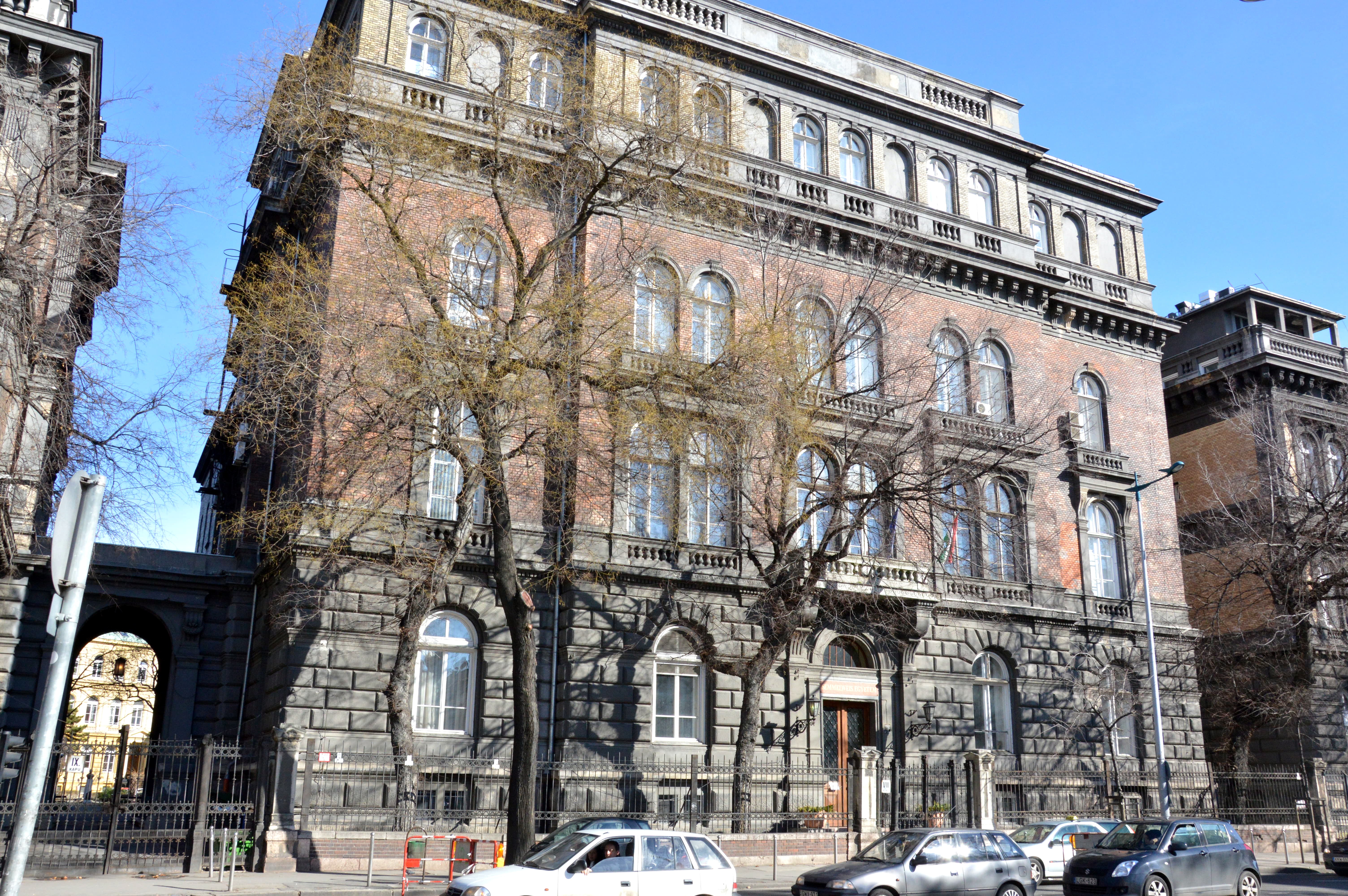The public interest management foundations (in short: public interest trusts - PITs) were set up by the Hungarian government in 2021 to restructure Hungarian higher education. Although the law on PITs has been amended several times in the context of the conditionality procedure launched by the European Commission, there have been no substantive changes to the PITs since their establishment. Our blog post summarizes the main problems stemming from double-faced legislation.
Update (9 February 2023): The Government announced on 9 February that Ministers will resign from the boards. However, the law on PITs has not been amended yet.

Main building of the Semmelweis University, Photo: Wikipedia
The Concept Behind PITs
The new institutional structure created in 2021 aimed to reform the organization of Hungarian higher education. The key reasoning was creating greater independence for the higher education sector and allowing a more flexible structure for higher education institutions to operate and generate additional revenues. While there seemed to be a consensus among many that structural reforms should be applied to the sector that incorporate the above mentioned aims, many have criticized the implemented reforms as a politically motivated action of the government to ensure its political influence in higher education and culture for an indefinite period of time. The lack of meaningful consultation and professional consensus underpin this impression.
The appointment of board members of these funds also seems to confirm this argument as a great number of them are government politicians, or academics and business people maintaining a friendly relation with the government party, appointed for life time. Furthermore, a number of foundations that are not universities perform activities that align with the political goals of the government party. All this makes it questionable to what extent formal rules can ensure the autonomy of these universities, if there is no intent to apply principles such as impartiality at the design of these institutions and its procedures.
As of today, there are only a few major universities left, which operate in their former form as state universities (ELTE, BME, University of Public Service, Liszt Music Academy, University of Fine Arts). Hence, the vast majority of Hungarian higher education takes the form of PITs. This also means that special attention needs to be paid to funding provided to these universities to ensure that they are spent in a transparent way and serve the purposes of research, education, innovation and academic purposes. It is not programmes such Erasmus+ that are at risk, but funds that can be used to finance questionable investments or programs that are implemented along clientelistic aims. This problem would not be necessarily resolved by implementing solely conflict of interests and asset management rules.
PITs are entities of a specific kind. Although they perform a public function, they are entities governed by private law and not by public law. Because their activities are governed by private law, PITs enjoy a high degree of freedom in their own operation and management. However, to support their public function, the Hungarian State has transferred assets worth billions of Euros to them that were partly used to maintain state universities. In this way, state property was essentially privatized when launching PITs, bypassing the law which provides the general rules for the alienation of state property. In addition it is questionable how fair or reasonable the distribution of assets and resources among the foundations was, especially as this might impact their capacities to absorb EU funds.
PITs are governed by boards of up to five people, whose members have been appointed by the government. This is how several ministers and secretaries of state have become members of the boards, while existing conflict of interest rules have been abolished to enable these appointments
The law also allowed the Hungarian State to relinquish the founding rights after the foundation and transfer them to the board itself. In this way, the Hungarian state has essentially voluntarily given up its right to have a say in the management of the assets. Although the PITs can accept contributions from the corporate sector and perform business activities, the vast majority of their resources come from public funds, as in addition to the free transfer of state assets, the Hungarian state is obliged by law to finance their operations serving public duties.
As the PIT legislation fundamentally puts academic autonomy at risk, amending a flawed concept might not bring about satisfactory results. Currently, the boards practice the founding, management and ownership rights, which provides the board unlimited control over higher education institutions. Calls from academics underline that a complete overturn of this new system would be needed and a new reform should be undertaken during which the affected institutions should be actively consulted.
Mr Tibor Navracsics, Minister responsible for negotiations with the European Commission and also a board member of PIT running University of Pannonia
Problems Concerning Public Assets
Despite the fact that they perform a public function and are entitled to ‘at least’ the same or higher level of financial support as state or municipal institutions, it is doubtful which state bodies are competent to oversee the use of these funds. Indeed, the courts of registration only carry out general checks on compliance and do not have supervisory powers over management of public funds.
- Therefore, the role and leeway of the State Audit Office, which is responsible for the protection of public funds and assets, should be clarified in the context of the PITs. The need is pressing as, according to the 9th Amendment of the Fundamental Law in 2020, the notion of public fund is limited to revenues, expenditures and claims of the State. The purpose of the amendment has been to limit the accountability and transparency of public spendings.
- In case of the alienation of PIT assets, the state should enjoy the right of first refusal.
Problems Related to Accountability of the Board
Currently, the law provides only some very basic rules on the structure and functioning of the boards. It gives the boards the freedom to elect its own members, even for an unlimited period. The legislation also does not specify what conditions members must meet to be eligible for membership. Although many government or local politicians have become members of the PITs, there are no rules set by law to regulate under what conditions the representatives of academics, student unions or alumni, experts in higher education or local interest groups or municipal representatives can have a seat on the board. The boards also are called upon to decide on the conflicts of interest of its own members, and the rules on conflicts of interest are less strict than anywhere in the public sector. Despite K-Monitor’s submission to the Hungarian Constitutional Court, alongside MPs and TI Hungary, the Court has not examined the loose conflict of interest rules since the summer of 2021.
Not only the election of the board members might be allotted to the board. The right to challenge board decisions is vested in the board itself, the supervisory board of the PITs and, in some cases, the public prosecutor.
- Legislation would need to specify
- who is entitled to appoint members,
- their exact term of membership,
- term limits,
- and the qualifications and experience that board members must have.
- In order to ensure academic autonomy, it should be considered to entitle the university Senate to comment on and approve new members of the board.
- Expert level public administration representatives may become board members, just as public officials that participate ex officio (e.g. mayors).
- As the prevailing rule on case-by-case examination of conflict of interest only reiterates the general rules of the Hungarian Civil Code, case-by-case conflict of interest rules should be complemented by mechanisms to control conflict of interest situations.
- General rules should provide that members of government are excluded from boards, just as other high level government officeholders and MPs. An absolute ban of dual mandates for these positions as it has been before 2021 could solve dependency on the government and the tension stemming from having a membership beside a full-time position in public service.
- It should be clarified that conflicts of interest might be not only political but also economic. This is especially relevant in cases where a board member is also the leader of companies where the foundation is a shareholder (e.g. MOL, Richter Gedeon).
- A cooling off period should apply to avoid revolving doors cases.
- Furthermore, it should be considered to apply the obligation to submit asset declarations to board members.
- In addition, third parties, for example public interest litigants or the Integrity Authority, should have standing to challenge decisions of the board along their mandate as the prevailing scheme of oversight does not ensure means against board decisions.
Lack of Transparency
As PITs perform public tasks, they are under the material scope of the Freedom of Information Act (FOIA). They are therefore subject to the general rules on proactive disclosure applicable to all public sector bodies. However, they are not subject to the online repository of contracts introduced this year in the framework of the conditionality mechanism. As PITs are not obliged to upload data on their contracts to the repository, the Authority of Data Protection and Freedom of Information has no power to call upon them to do so or to impose a fine on them if they failed to comply with any rules of FOIA. Currently, the Authority can kindly invite them to meet the general rules of proactive disclosure. Lack of real enforcement can be traced as most of the PITs have failed to publish public interest data on their site. K-Monitor’s complaint flagging this problem to the Authority remained unanswered since November 2021.
- As PITs perform public tasks, mainly using public money, the online repository should apply for PITs too. Broadening the material scope of the repository would strengthen the powers of the Authority and make enforcement in the field of FOI more efficient.
If you would contribute to the fight against corruption in Hungary,
Support K-Monitor with a gift!
Címkék: english EU conditionality
Szólj hozzá!
A bejegyzés trackback címe:
Kommentek:
A hozzászólások a vonatkozó jogszabályok értelmében felhasználói tartalomnak minősülnek, értük a szolgáltatás technikai üzemeltetője semmilyen felelősséget nem vállal, azokat nem ellenőrzi. Kifogás esetén forduljon a blog szerkesztőjéhez. Részletek a Felhasználási feltételekben és az adatvédelmi tájékoztatóban.






